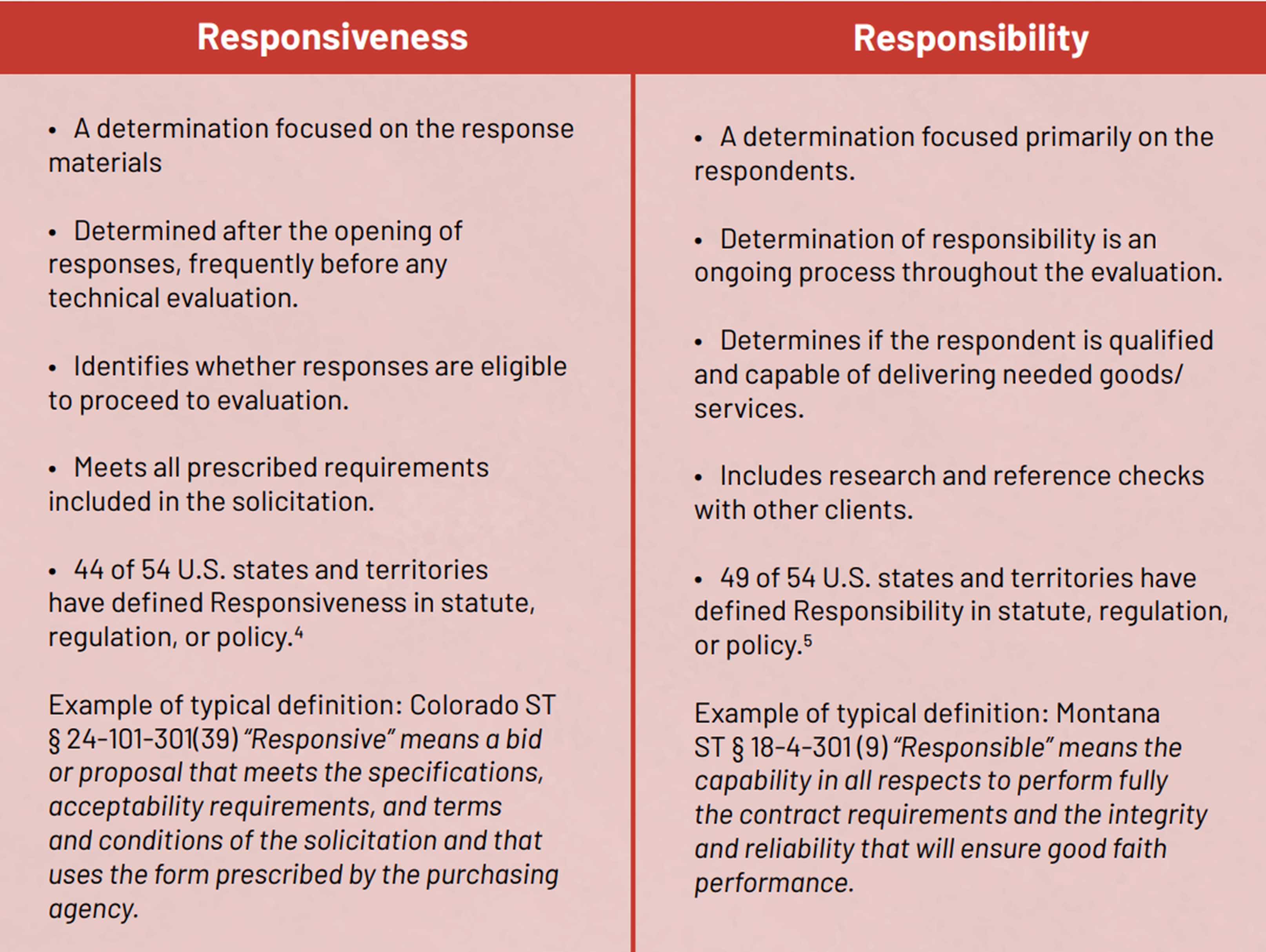Deciphering procurement codes, laws, and ethics can be daunting. However, procurement jargon can add to a hazy understanding of fundamental points in the procurement process. In a constant effort to make your life as a procurement professional easier, NASPO recently published a Fact Sheet on the difference between Responsiveness and Responsibility. These key terms are often confused with one another, with neither being fully understood.
Sneak Peek from the Fact Sheet:
If you have ever struggled to explain the difference between these terms, have no fear. Just keep reading. Below is an overview of both Responsiveness and Responsibility from the Fact Sheet:
Responsiveness is assigned to the content of a bid or proposal based on the criteria set out in the solicitation.[1] Procurement officials determine whether the submission meets the substantive standards – the offer is for goods or services that meet the specifications listed – and the formal standards – the offer is compliant with the rules established for the competitive solicitation.[2]
Responsibility is a judgment assigned to an offeror or potential supplier who responds to a solicitation. A responsible offeror is a business or individual who is financially and technically able to perform what is required as outlined in the solicitation.[3]

The Importance of Both
Both responsiveness and responsibility are critical to ensuring a successful procurement process. A focus on responsiveness ensures that all bids are given equal consideration based on their adherence to the solicitation requirements. This helps maintain fairness and transparency in the procurement process.
Meanwhile, assessing responsibility ensures that the selected bidder is compliant and capable of delivering on the contract. This reduces the risk of project failures, delays, and substandard performance. Balancing these two aspects is key for procurement professionals. They must be meticulous in their initial review to ensure all bids are responsive and thorough in evaluating responsibility to select a reliable and capable bidder.
Understanding these concepts is equally important for bidders. Ensuring that their bids are fully responsive to the solicitation requirements increases their chances of consideration. Demonstrating their responsibility through detailed documentation of their financial stability, experience, and capabilities further strengthens their proposals.
Remember, responsiveness and responsibility are integral to the procurement process, ensuring that contracts are awarded fairly and executed successfully. By taking a proactive approach to both facets, procurement professionals can safeguard the integrity and effectiveness of their procurement processes, ultimately leading to enhanced results for their organizations.
Want to know more?
If you’d like to dig a little deeper and learn more about Responsiveness vs Responsibility, check out these resources:
- NASPO’s Fact Sheet: Responsiveness v. Responsibility
- Visit NASPO’s Repository of State Practices to see how each state and territory defines these terms and their rules for determination.
- The Procurement U Evaluation and Award Strategies course covers more about responsiveness and responsibility and the related considerations and processes.
[1] NASPO, “Chapter 5: Solicitation Methods” in State & Local Government Procurement: A Practical Guide, 4th ed. (Plantation J. Ross Publishing, 2024), 70.
[2] Chadwick Stephens, “Fact Sheet: Responsiveness v. Responsibility,” NASPO, last modified May 13th, 2024, https://cdn.naspo.org/RI/ResponsivenessvResponsibilityFactSheet.pdf.
[3] NASPO, “Chapter 5: Solicitation Methods” in State & Local Government Procurement: A Practical Guide, 4th ed. (Plantation J. Ross Publishing, 2024), 69.
